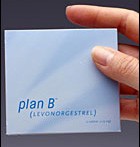Morning-after pill

October 19, 2006
The emergency contraceptive drug, often referred to as “the morning-after pill,” has new controversial availability for persons over the age of 18. The Food and Drug Administration approved the sale of the drug over the counter as of August 2006.
Emergency contraceptive pills (ECP’s) are used for preventing pregnancy after unprotected sex or contraceptive failure. The pills contain high doses of the hormones estrogen and progestin (levonorgestrel), the same drugs used in ordinary birth control pills.
The FDA approved the use of ECP’s in the late 1990’s. There are currently two types of the pills available — Preven and Plan B. The most commonly used of these is Plan B.
According to the FDA’s Web site, the Plan B drug consists of two 0.75 mg levonorgestrel pills that should be taken orally within 120 hours of unprotected sexual intercourse. The pills can reduce a woman’s risk of becoming pregnant by up to 95 percent.
Although many people believe that the pills cause abortions, this is a common misconception.
“Many people see the pill as an abortificant — something that would cause an abortion in someone who is already pregnant — but that is not the case,” said Jackie Brittingham, associate professor of biology. “The mechanism of action is to prevent ovulation. If you prevent ovulation there is no way the sperm and egg can come together because the egg is not released from the ovaries.”
The availability of the drug over-the-counter in Indianola is non-existent at this point. Both Medicap and Wal-Mart pharmacies will have the pills available for over-the-counter purchase as soon as they become readily available. Walgreens plans on having the pills available for sale as soon as November.
The Hy-Vee Pharmacy in Indianola will also have the pills available for over-the-counter purchase but will take a bit of a different route in their distribution.
“We will keep the pills in the back, in the same manner that Sudafed is sold,” Hy-Vee Pharmacy Manager Steve Sayler said. “This could be a potentially volatile issue, but all you have to do is ask for it.”
Planned Parenthood of Greater Iowa Web site offers a listing of the pharmacies in the area that will carry the ECP’s.
“In recent months, we’ve surveyed over 400 pharmacies statewide (both chain and independently-owned stores) to determine access and availability of ECP in Iowa pharmacies,” said Kathi Di Nicola, director of marketing and communications at the Planned Parenthood of Greater Iowa. “The responses have been categorized based upon Planned Parenthood’s opinion that pharmacies and pharmacists must ensure immediate access to ECP without discrimination or delay.”
The ECP’s will not be available for sale to persons under the age of 18. Minors are able to take the pills, but will only be able to obtain them with a prescription.
“There is some controversy that women 17 and younger would be very likely to need this particular drug,” Brittingham said. “I think at this point the majority of people are not comfortable with that, which makes it difficult to pass that kind of legislation.”
The advantages and disadvantages of having the drug available over-the-counter will become apparent as time progresses.
“I do think that this is a double-edged sword,” Brittingham said. “You have to be concerned that women could be using this as their primary method of birth control, but now it [is] readily available when it’s needed.”











